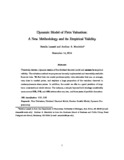Dynamic Model of Firm Valuation: A New Methodology and its Empirical Validity
| dc.contributor.author | Lazzati, Natalia | |
| dc.contributor.author | Menichini, Amilcar A. | |
| dc.date.accessioned | 2015-04-08T23:01:18Z | |
| dc.date.available | 2015-04-08T23:01:18Z | |
| dc.date.issued | 2014-11-14 | |
| dc.identifier.uri | https://hdl.handle.net/10945/44907 | |
| dc.description | SSRN-id2435328 | en_US |
| dc.description.abstract | This study derives a dynamic version of the dividend discount model and assesses its empirical validity. The valuation method we propose can be easily implemented and uses widely available nancial data. We nd that our model produces equity value estimates that are, on average, very close to market prices, and explains a large proportion of the variation observed in contemporaneous share prices. In addition, the model we o¤er is a good predictor of long- term cross-sectional stock returns. For instance, a simple buy-and-hold strategy consistently earns around 22%, 37%, and 49% returns after one, two, and three years of portfolio formation. | en_US |
| dc.rights | This publication is a work of the U.S. Government as defined in Title 17, United States Code, Section 101. Copyright protection is not available for this work in the United States. | en_US |
| dc.title | Dynamic Model of Firm Valuation: A New Methodology and its Empirical Validity | en_US |
| dc.type | Article | en_US |
| dc.contributor.department | Graduate School of Business & Public Policy (GSBPP) | en_US |
| dc.contributor.department | Graduate School of Business & Public Policy (GSBPP) | |
| dc.subject.author | Firm Valuation | en_US |
| dc.subject.author | Dividend Discount Model | en_US |
| dc.subject.author | Gordon Growth Model | en_US |
| dc.subject.author | Dynamic Programming | en_US |


